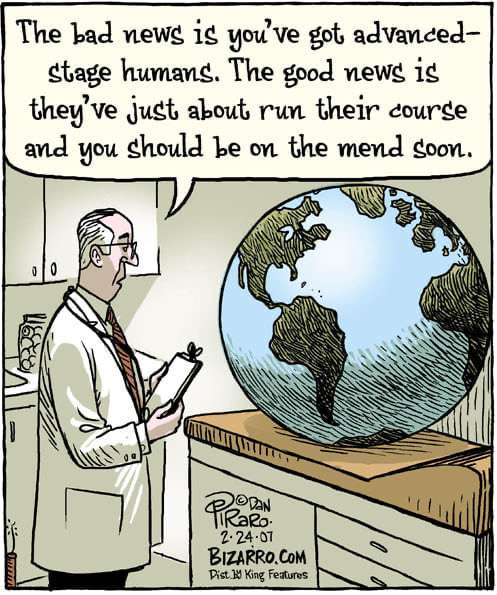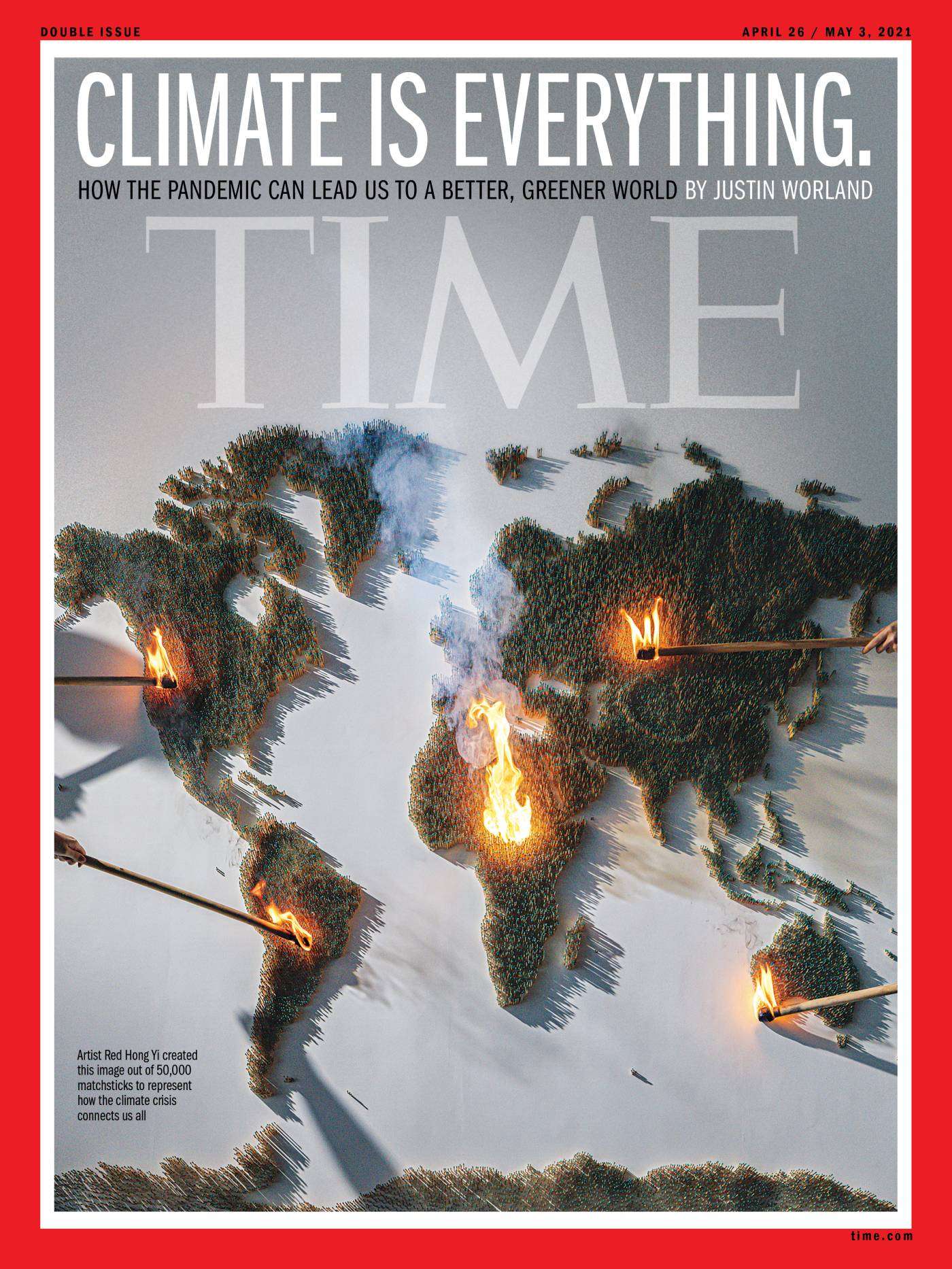EARTH DAY 2021 – DIRE WARNINGS WITH A DEGREE OF HOPE
BY Allan Maynard, MSc, April 2021

“How is it possible that that most intelligent creature to ever walk the planet Earth is destroying its only home” – Jane Goodall
Last April 21st was the 50th anniversary of Earth Day. In my blog of that date, I stated – “By many measures our planet’s environment is having one of its best earth days in decades. The tragic pandemic that is causing so much human misery is also giving Planet Earth a rest – a much needed breather”.
This year unfortunately, the pandemic is still with us. But Planet Earth is not getting the same degree of relief. In fact, carbon dioxide emissions are forecast to jump this year by the second biggest annual rise in history, as “global economies pour stimulus cash into fossil fuels in the recovery from the Covid-19 recession. The leap will be second only to the massive rebound 10 years ago after the financial crisis and will put climate hopes out of reach unless governments act quickly”, the International Energy Agency has warned.
However, there is a sense, especially after the US led April 22, 2021 climate summit, that business as usual is no longer an option in recovering from the economic consequences resulting from the pandemic.
OVERWHELMING EVIDENCE
There is no longer a legitimate debate about the reality of global warming leading to climate change disasters. What was once a warning 50 years ago is now a part of everyday life around the world. Carbon dioxide levels in the atmosphere have risen from 280 PPM in 1970 to over 420 PPM in 2020. The temperature in the arctic is over 5 degrees warmer thereby shrinking sea ice by over 2.6 million square km and greatly affecting ocean currents.
In 2020 alone we witnessed deadly floods in SE Asia and Bangladesh, bushfires in Australia, wildfires in California and Siberia, both drought and record rainfall in China, and extreme storms from the Philippines to Nicaragua. The extremely active 2020 Atlantic hurricane season concluded with a record-breaking 30 named storms and 12 landfalling storms in the continental United States. Drought conditions now cover 85 per cent of Mexico. Lakes and reservoirs are simply drying up, including the country’s second-largest body of fresh water with millions of Mexicans now experiencing water shortages.

Floods in Indonesia – from USA Today
There are many more stark examples. The main point – we are seeing dramatic levels of damage and health consequences due to environmental degradation and it’s getting worse each year.
DIRE WARNINGS
The majority of environmental scientists are warning that many parts of planet earth are now experiencing ecocide – defined by the United Nations as “criminalized human activity that violates the principles of environmental justice, as by substantially damaging or destroying ecosystems or by harming the health and well-being of a species. Others claim that we are entering a 6th mass extinction. Consider 3 examples — 1) 60% of the worlds invertebrate population has vanished since the 1950s, 2) 90% of the ocean’s fish stocks have now been exploited, 3) 40% of the earth’s land area is now used for agriculture.
A growing climate emergency means ever greater threats to water and food security, along with destabilised ecosystems. As climate change takes its toll on Earth’s physical planet, it will also cause social, economic, and political chaos as refugees flee areas that can no longer sustain them. By many measures, this is already happening.
On Earth Day 2021 (April 22nd), one hundred and one Nobel laureates, including the Dalai Lama, released an open letter directing governments around the world to sign up to a fossil fuel non-proliferation treaty to help tackle the climate crisis. In this letter they state “Climate change is threatening hundreds of millions of lives, livelihoods across every continent and is putting thousands of species at risk. The burning of fossil fuels – coal, oil, and gas – is by far the major contributor.”
There is no question – we MUST confront the possibility that the threat from climate change may indeed be existential.
RAYS OF HOPE
Despite the dramatic consequences of and dire warnings about climate change and environmental destruction, there are some rays of hope. Here are 3 examples.
Decoupling economic growth from CO2 emissions — Christiana Figueres is the former executive secretary of the UN Framework Convention on Climate Change (2010-2016). In a recent Op-Ed she writes “History will remember this decade as the climate turning point, the moment we finally woke up to the fact that despite (and because of) shocks like Covid-19, decarbonization — the reduction of carbon dioxide emissions — is now inevitable. The only question is how fast we will achieve it.” Thankfully, there is increasing evidence that the world is on a positive track to decouple CO2 emissions and economic growth breaking a long-established concept that economic growth requires more fossil fuel consumption. Since 2005, 32 countries (including the US and the UK but not Canada), each with a population of at least one million people, have decoupled (in absolute terms) emissions from economic growth, both for terrestrial emissions (those within national borders) and consumption emissions (emissions embodied in the goods consumed in a country). These countries prove that positive economic outcomes can be achieved in the transition to clean energy.
Making Climate Change the Cornerstone of Recovery – Spurred by alarming science based evidence, growing public outcry, massively increased insurance costs and human migrations, — governments, industrial leaders and civil society leaders are finally waking up to the notion that climate is at the center of everything(health, food production, national security, equality, crime prevention and more). Europe has already allocated hundreds of billions of Euros to put climate front and center. As well, trillions in investments around the world are now going towards energy transition.

May 3rd issue of Time Magazine
And now – importantly, the US is back at the table with a progressive ambitious plan along the lines of Europe’s. The US and Europe together represent 40% of the world’s economy so it is unquestioned that other countries will need to catch up or face possible trade sanctions.
China’s latest five-year plan unveiled last month, disappointed many by failing to include a tougher target. However, at the recent US led summit this month, president Xi Jinping said China’s coal consumption would peak in 2025, which would take the country – and the world – a long way towards the cuts needed. Time will tell on this one but clearly the US and Europe will be paying very close attention.
Much Cheaper Renewable Energy – The International Energy Agency now confirms that solar is providing the cheapest energy the world has ever seen. In a quirk of history, what had begun as an American drive to wean itself off oil (started by the Carter administration and dropped by the Reagan administration) was eventually taken up by China, making solar power dirt cheap in the process. In the past decade, renewable prices have plummeted: onshore wind down 70%, solar by 89%. Both are now cheaper that coal. With the rapid growth of renewable electricity, the case for electrifying transportation systems around the world becomes more and more obvious.
PUSH BACK IS EXPECTED
Of course, there will be the usual push back against progressive plans from the fossil fuel industries along with the politicians, think-tanks, and media they support. From past observations, the loudest cries will center around government overreach and attempts to link the plans to socialism. It is important to remember however the important role government has played in all economic transformations. Consider for example the recoveries after World War II. Moreover, government lead initiatives in Canada and the US made possible the rail lines that opened our frontiers, electric grids in rural communities, highway systems everywhere, the invention and coomercialization of nuclear power and the space age (with accompanying satellite technology). Even the internet (originally called ARPANET) was developed as a complex collaboration of universities, government agencies and industry – and funded by the US Dept. Of Defense.
————————————-
IN SUMMARY – In my view, the extent of the dual crises (CoVid 19 and environmental collapse) requires extensive government involvement as we invest in a sustainable future. There is hope that the tides are turning. Most scientists and economists re-iterate the need for big, bold, and progressive initiatives and at least some leaders are listening.
https://www.washingtonpost.com/politics/2021/04/20/predictable-economic-effects-climate-change-have-started-appear/
https://www.theguardian.com/environment/2021/apr/21/101-nobel-laureates-call-for-global-fossil-fuel-non-proliferation-treaty
https://www.theguardian.com/environment/2021/apr/20/carbon-emissions-to-soar-in-2021-by-second-highest-rate-in-history
https://www.theguardian.com/commentisfree/2021/mar/19/planet-pursuit-profit-oil-companies-damage#comment-148148297
https://www.theguardian.com/environment/2021/feb/25/atlantic-ocean-circulation-at-weakest-in-a-millennium-say-scientists
https://www.theguardian.com/australia-news/2021/apr/25/insanely-cheap-energy-how-solar-power-continues-to-shock-the-world
https://fossilfueltreaty.org
https://www.cnn.com/2021/04/22/opinions/climate-crisis-biden-summit-figueres/index.html

Earth Day 2021 is over but this is warning with hope with respect to climate change. Thank you ????